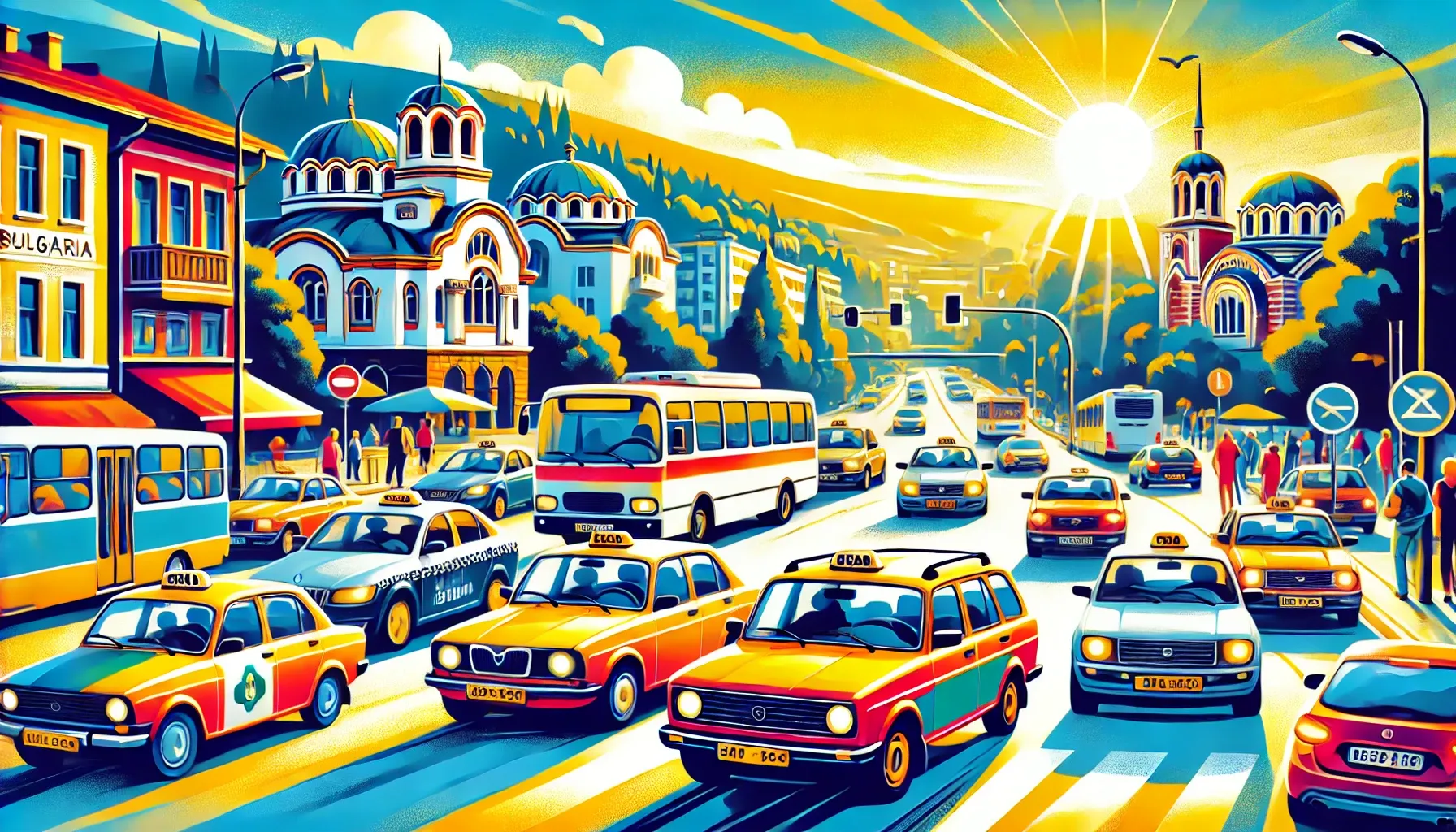How to get to Bulgaria and how to organize transportation within the country?

- What is the easiest way to get to Bulgaria and travel around the country?
- How to get to Golden Sands: taxi, rental, and traffic rules
- What is the transportation system of Bulgaria like and what are its features?
How to get to Bulgaria
In our review, we will discuss in detail how to get to Bulgaria, what options are available for getting around the country, and what traffic regulations are in place here. We will also cover various modes of transportation, such as taxis, car rentals, bus routes, and train travel.
Transport options in Bulgaria
Bulgaria is renowned for its diverse transportation options, encompassing air, land, and water routes. In recent years, there has been an active upgrade of transportation infrastructure and routes, creating excellent conditions for both tourists and those considering Bulgaria as a new homeland. Each year, more and more Russians, including families with children and elderly people, choose this country for real estate purchases. This is also due to the fact that Bulgaria can be reached by both air travel and land transport, which is especially convenient for those who prefer to travel by land for health reasons.
The most convenient ways to get around
The most convenient way to get to the Bulgarian coast or Sofia from Russia is by air travel. However, for those who prefer alternative options, there are car trips through Romania or train journeys available. There is a direct train connection between Moscow and Sofia, and it is also possible to reach resorts like Varna or Burgas with transfers. The travel time is approximately two days.
International airports
The main international airports in this country are located in the largest cities that are popular among Russians and real estate buyers, such as:
- VarnaandBurgas— are located on the coast of the Black Sea;
- SofiaandPlovdiv— located close to ski resorts.
The airports of Varna and Burgas operate year-round, with an increase in the number of flights during the summer season. Plovdiv Airport typically receives flights from Russia only in the winter months, from December to March, when the number of skiers rises.
Direct flights from Russia
Direct flights to Bulgaria are available from many Russian cities, including:
- Moscow
- Saint Petersburg
- Samara;
- Yekaterinburg;
- Perm
- Novorossiysk;
- Ufa.
The flight from Moscow to Varna takes about three hours, while from St. Petersburg it takes around three and a half hours. Domestic airports in Bulgaria, such as Stara Zagora, Gorna Oryahovitsa, Targovishte, and Ruse, also provide services for local airlines.
Road trip
For those planning a road trip, it's important to note that the distance from Moscow to Varna is about 2000 km. If you have a Bulgarian visa or residence permit, you won't need a transit visa for Romania.
Taxi and car rental
When it comes to taxis and car rentals, airports in Bulgaria are usually located 10-15 km from the city center, which means you can pay around 10 euros for a taxi ride. This makes using such services an affordable and comfortable option for tourists. Renting a car offers a unique opportunity to explore Bulgaria at your own pace, allowing you to plan trips as you wish.
Conclusion
Ultimately, all types of transportation in this country provide a high level of comfort and variety, meeting the needs of both locals and visitors.
If you need to get to the popular resort of Golden Sands directly from Varna Airport, which is only 25 kilometers away, the average cost of the trip will be around 20 euros. It's important to mention that in Bulgarian airports, you can often encounter illegal taxi drivers who may charge significantly higher prices for their services. Therefore, it is recommended to order a taxi through official channels. In Bulgaria, you have the option to call a taxi by phone, as well as approach a driver waiting at a designated stand; often, the first method turns out to be more advantageous.
Car rental in Bulgaria
Various car rental companies operate actively at the airport and in major cities. Rental prices depend on the class of the vehicle and can range from 20 to 60 euros per day. For example, a small car like a Volkswagen Polo can be rented for a week in August starting at 20 euros per day. If you plan to rent from an international company, keep in mind that you will likely need to pay a deposit, which can vary from 300 to 600 euros. Additionally, for a small extra fee of about 1 euro per day, you can rent a child seat, ski rack, and other special accessories.
Requirements for renting a car
- Tenant's age:at least 20 years.
- Driving experience:at least one year.
- Driver's license:It must be valid and written in Latin script.
It is also recommended to obtain an international driving permit, as some international companies may have stricter requirements. Therefore, it will be helpful to familiarize yourself with the rental requirements in advance when choosing a company.
Traffic rules
The traffic rules in Bulgaria are quite standard: right-hand traffic is in effect here.
29 September
9 October 2024
9 October 2024




- 50 km/h in cities,
- 90 km/h outside populated areas,
- 130 km/h on highways, unless otherwise specified.
The blood alcohol level for drivers should not exceed 0.5 per mille, which is roughly equivalent to one liter of beer.
Condition of the roads
In the early 2000s, most roads in the country were in a deplorable state; however, in recent years, active work has been carried out to modernize and reconstruct them. The process of updating infrastructure and building new roads significantly accelerated after Bulgaria joined the European Union.
Road tax
In Bulgaria, there are no toll roads in the conventional sense; instead, a road tax—known as a vignette—is charged, which applies to all highways except for municipal ones. This tax affects drivers passing through the "New Europe" bridge and the Danube bridge at the border with Romania. However, the Bulgarian government is considering the introduction of toll roads for passenger cars in the future, which could significantly change transportation conditions in the country.

Introduction of the electronic fee system
Since March 1, 2020, an electronic toll collection system has been in operation in Bulgaria, covering all vehicles weighing over 3.5 tons. The country has six main highways, although some of them are temporarily closed for maintenance work.
Highways of Bulgaria
The A1 motorway connects the capital Sofia with the coastal city of Burgas, while the A2 connects Sofia with Varna. The A3 is a transport artery from Varna to Burgas, the A4 motorway is under construction and will link Peromay with Kapitan Andreevo, the A5 offers a route from Sofia to Pernik, and the A6 connects Pernik to Kula.
It should be noted that when bringing a vehicle into Bulgaria, a special sticker called a "vignette" must be purchased at the border for the right to use the roads. The cost of this "vignette" is approximately8 euros for a weekor15 euros per monthA small fee for environmental needs is also required.
Public transport in Bulgaria
The bus transport sector in Bulgaria has significantly modernized, making public transport trips more comfortable, even in hot weather, thanks to the presence of air conditioning. Both state-owned and private bus companies operate in the country.
- The fare for municipal routes starts from4-5 levaabout2.5 euros)
- Prices may increase depending on the distance, reaching16-18 levaApproximately9 euros)
The metro in Sofia
In the capital, Sofia, the most popular mode of transportation is the metro, which is unique to this city. It consists of four lines and covers 47 stations. The metro opened in 1998, and since then, the network has been expanding with new stations every year.
Recently, a regular train service has started operating between the stations "Kazichene" and "Bankya". Future plans include expanding the routes to cover towns such as "Pernik", "Svoge", "Gorna Malina", and "Dragoman". The cost of a metro ticket is1.6 levaabout80 euro cents).
Railway communication in the country
The country's railway system is also well-developed and connects key cities in Bulgaria. Trains can reach speeds of up to130 km/hand the management of the railways is carried out by the company "Bulgarian State Railways".
- The travel time from Sofia to Varna is from7 to 9 o'clock
- The trip to Burgas takes about6 hours
- The ticket prices range from10-12 eurosIt depends on the level of comfort of the carriage.
Ports and river navigation
Bulgaria, thanks to its geographical location by the sea, has two major ports — Varna and Burgas, which provide connections with the ports of Russia, Ukraine, Turkey, and other Mediterranean countries. River navigation is also well developed, with the Danube River serving as the main artery, fulfilling both national and international transport functions.
Conclusion
In conclusion, I would like to note that Bulgaria offers its visitors numerous opportunities for comfortable and convenient travel. The country's transportation infrastructure, from international airports to modern train and bus routes, provides easy access for both tourists and those looking to purchase property here. Understanding the various ways to reach Bulgaria, including options by air and land, allows everyone to choose the most suitable option based on personal preferences and circumstances.
Taxi and car rental
Taxis and car rentals make traveling within the country even more accessible, which is especially important for families with children or elderly people. Transparent and affordable taxi rates, along with the option to rent a car on favorable terms, allow for easy enjoyment of the beauty of the Black Sea coast and the mountain resorts of Bulgaria.
Traffic rules
Equally important is the adherence to traffic rules, which only improve over time. Modern roads and access to information about traffic conditions make trips as safe and convenient as possible. By following the rules and being attentive on the road, travelers can enjoy not only the natural beauty of this country but also its culture and history.
Important points
- Comfortable transportation:Bulgaria offers a variety of transportation options.
- Availability of taxis:Low and transparent rates make taxis a convenient way to get around.
- Car rental:Allows for flexible planning of routes and travels across the country.
- Traffic rules:Following the rules ensures safety on the roads.
Ultimately, Bulgaria is the perfect country for a vacation, and the combination of affordable transportation infrastructure, friendly locals, and picturesque landscapes allows everyone to have a memorable holiday or permanent residence here. I hope my guide to transportation options in Bulgaria will be helpful for those planning their trip or move to this wonderful country. I wish everyone good luck on their journey to new experiences and unforgettable adventures in Bulgaria!
Tags
Comment
Popular Posts
29 September
384
9 October 2024
1485
9 October 2024
9940
Popular Offers

Subscribe to the newsletter from Hatamatata.com!
Subscribe to the newsletter from Hatamatata.com!
I agree to the processing of personal data and confidentiality rules of Hatamatata










